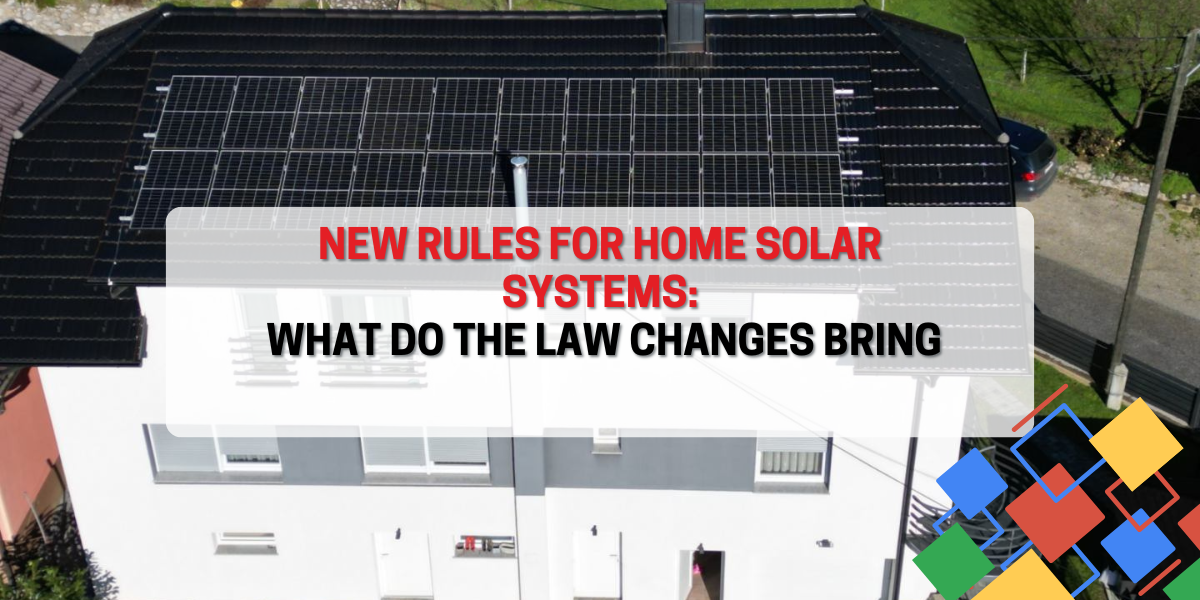News date: 21. 07. 2025.
New rules for home solar systems: What do the law changes bring?

As of January 1, 2026, significant changes will take effect in the system for promoting the use of renewable energy sources, based on the new Act on Amendments to the Renewable Energy Sources and High-Efficiency Cogeneration Act (NN 78/2025). The changes particularly affect users of home photovoltaic systems, as the method of calculating the energy delivered to and drawn from the power grid is being revised.
💡 What do the new law changes mean for solar power plant owners?
The previous electricity billing system for Croatian home solar plant owners was highly favorable, using monthly net metering: users paid only the difference between consumed and delivered energy, with surpluses carried over. The grid acted as a virtual battery, and a guaranteed purchase price for surpluses made solar investments predictable and profitable.
 However, the legal amendments bring significant changes:
However, the legal amendments bring significant changes:
• Net metering is abolished and replaced with per-kWh billing – each kWh drawn from the grid is charged in full, regardless of prior energy delivery. Sold energy no longer reduces grid fees but is simply subtracted from the final bill.
• A variable purchase price is introduced – more exported energy means lower compensation, encouraging self-consumption. Oversizing systems without considering daily usage now carries greater financial risk.
The new model favors systems that maximize real-time self-use, especially those with battery storage to minimize evening grid reliance. Profitability is still achievable—potentially within ten years—but now depends on smart system sizing, consumption optimization, and energy management. Indiscriminate installations are no longer viable; precise, efficient solutions are the new standard.
☀️ Key Recommendations for Smart Investment in Solar Systems
Given the new billing model that significantly changes the financial dynamics of home solar power plants, future investors should approach planning with greater care and a thorough understanding of the technical and economic conditions.
 Under the new billing conditions, hybrid inverters become the smartest option for the future of home solar systems. Unlike standard models, they allow easy connection to batteries—either during initial installation or later on—without additional modernization costs. Even if a battery system is not planned right away, it is recommended to install a hybrid inverter to avoid expensive upgrades in the future.
Under the new billing conditions, hybrid inverters become the smartest option for the future of home solar systems. Unlike standard models, they allow easy connection to batteries—either during initial installation or later on—without additional modernization costs. Even if a battery system is not planned right away, it is recommended to install a hybrid inverter to avoid expensive upgrades in the future.
This predictability in system design ensures flexibility for future upgrades without significant additional costs. It enables maximum energy utilization, higher self-consumption, and long-term adaptability of the system. With the growing importance of battery storage and the need for precise alignment of production and consumption, hybrid inverters become the foundation of every sustainable and cost-effective solar solution.
🏘️ New Rule: Surplus Solar Energy Can Be Shared Between Locations
In addition to the increasingly popular battery storage, the new legislation introduces another valuable option:
• sharing produced energy between different locations owned by the same person.
Owners can now use energy from their solar power plant at other properties they own, as long as the properties are registered under the same personal identification number (OIB). This allows solar systems to be designed based on the total consumption across all metering points, increasing energy utilization without needing to sell surpluses at low purchase prices. Only grid fees and regulated charges apply—there is no supply component on the bill. The new law encourages the development of energy communities and strengthens the role of citizens as prosumers (producer-consumers), although technical guidelines for full implementation of this model are still pending.
🏡 Those Who Act on Time Save More: Rules for Solar Energy Billing
If you already own a solar power plant or plan to build one soon, it’s essential to understand how your energy will be billed. Citizens who receive the Connection Possibility Notification from HEP ODS by December 31, 2025, can still benefit from the current, more favorable billing system for ten years from the start of the plant’s permanent operation.

On the other hand, anyone who starts the process after January 1, 2026 will fall under the new rules. This means that energy will be valued differently, which could potentially impact the profitability of the investment.
That’s why now is the right time to act. If you’re considering investing in a solar power plant, your first steps should be to develop the main electrical design and obtain approval from the distribution operator. The approval is valid for two years, during which you must complete the project. Acting promptly ensures you secure the current, more favorable billing conditions before the new regulations take full effect.
Don’t wait until the last minute – secure better conditions while you still can. Investing in your own energy production remains a smart decision, but the pace of legal changes demands a quick and well-informed move toward implementation.
Our company specializes in the design and implementation of solar power systems, offering a complete service—from developing the main electrical project to securing the Connection Possibility Notification. Backed by licensed electrical engineers and energy experts, we lay the legal groundwork for your system to qualify under favorable conditions. We ensure regulatory compliance, deliver optimal technical solutions, and provide full support every step of the way.



